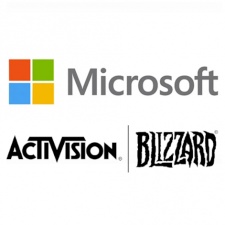Welcome to our series of 2022 highlights, where we take a thorough look at the big issues that have shaped the year. Starting with the (still ongoing) story of Microsoft’s attempt to secure themselves a major slice of the gaming market…
Although mobile gaming remains the most profitable sector of the games industry, it’s console gaming that tends to dominate mainstream tech news – primarily the ongoing battle for dominance between Sony’s PlayStation and Microsoft’s Xbox. Every few years the feud heats up with the release of a new console generation – a battle that PlayStation has historically won.
The past few years has seen each company making acquisitions to increase their market share, but while Sony has focused on the acquisition of studios with which it has a strong working history, such as Naughty Dog and Sucker Punch, Microsoft has been acquiring studios that have historically created multi-platform titles, such as ZeniMax Media, parent company of Bethesda (Fallout, Elder Scrolls), Tango Gameworks (The Evil Within), and Arkane Studios (Dishonored).
As such, Activision Blizzard wasn’t just an attractive prospect for Microsoft, but one that fit in well with its previous acquisitions, thanks in no small part to Activision Blizzard’s mobile division, King – one of the most profitable mobile game makers in the world, and one that could help Microsoft gain a foothold in the market which it has historically lacked.
Competition of monopoly?
At $68.7 billion, this acquisition, should it be completed, will be the biggest of all time, however it has fallen into scrutiny. Although the deal has been approved in several territories such as Saudi Arabia, others have proven harder to convince, with the EU, UK, and the USA launching in-depth investigations, and PlayStation boss Jim Ryan has reportedly been lobbying the EU to block the deal.
The big sticking point is one franchise in particular: Call of Duty, one of the most popular (and profitable) game franchises of all time, and one that has historically been available across platforms. Although Microsoft has stated its intention to keep the series available on PlayStation consoles, regulators and industry experts remain unconvinced. Adding to their concerns is Microsoft itself, which has refused to put its money where its mouth is by formally committing to the deal through a binding contract. As such, both regulators and competitors are concerned, perhaps rightfully, that the acquisition could result in a historically multi-platform hit being made exclusive to Xbox, despite Microsoft’s assertions to the contrary.
In perhaps the biggest blow to the deal’s future, the FTC has voted to sue Microsoft in an attempt to scupper the acquisition, citing concerns that the deal would “thwart competition by denying rivals access to popular gaming content.”
What does the future hold for the deal? Well, that’s uncertain. While the approval of different territories isn’t technically a necessity for the deal to be completed, it could negatively affect the new entity’s ability to conduct business in these regions – and with some of the world’s biggest markets either investigating the deal or outright attempting to block it, the acquisition could just as easily be abandoned as completed.

